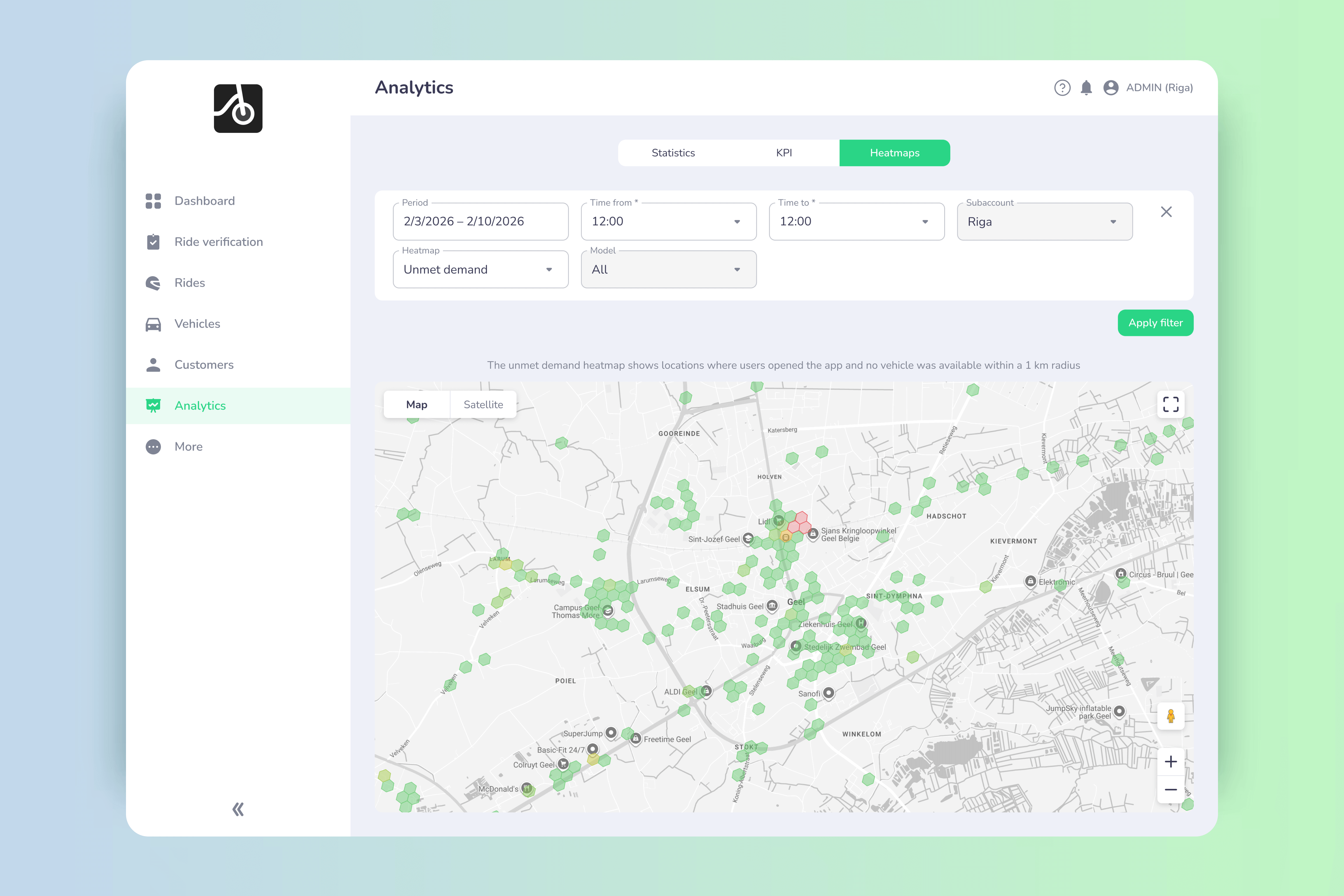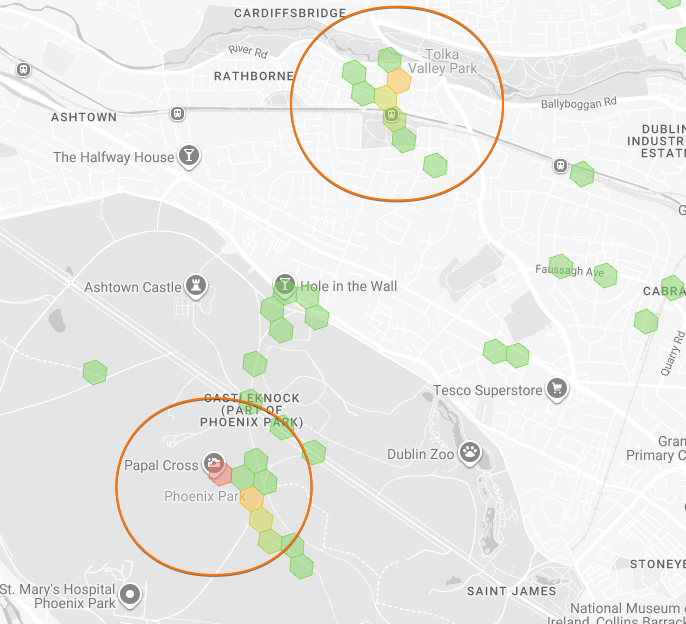
At ATOM Mobility, we know there is a lot to consider when starting a mobility company. To help make the process easier, we’ve put together a breakdown of some most frequently recommended manufacturers of smart locks and docking stations on the market. Contact us in case you need a guidance or more information.

Spin tested solar-powered charging stations by Swiftmile in a pilot program
While free-floating model (when scooters and bikes can be parked anywhere within the parking zone) is experiencing a growing demand, it also faces some challenges such as the problem of discharged vehicles, vandalism and pressure form the municipality. In some cases smart locks or even docking/charging station is a good option to take a look at. In this short article we will give a brief overview of manufacturers that in our opinion can provide quality solution for this problem.
Smart locks
Omni is one of the leading providers of smart locks for bike sharing, it is used by companies like Ofo, Mobike and many others. Affordable price and built-in GPS is a winning combination. Optional solar recharge capacity means unlimited time standby and no need to worry about battery life.
Suitable for: bikes and e-bikes
Price: 50-70 USD/ 45-65 EUR depending on model and quantity. Will require SIM card with data to track location

Omni smart lock
Linka has two main models - Original and Leo. The difference is that Original lock has not built-in GPS, which means that you will rely on user phone data and will not have real-time information about bike location. This is why we prefer Linka Leo - which is high-quality product with great design.
Suitable for: bikes and e-bikes
Price: 169 - 269 USD / 150 - 250 EUR depending on model and quantity. Leo model requires SIM card with data to track location
Lattis offers U-type lock with special case and chain for scooters. It is high quality product, but similarly as with Linka original it does not have bult-in GPS. However, we believe it can be a good additional security layer for scooter sharing (where you already have Iot with GPS data).
Suitable for: scooters, bikes and e-bikes
Price: 150 - 199 USD / 160 - 180 EUR depending on accessories and quantity

Lattis smart lock
Axa from Netherlands has been on the market for a while and their locks are used by Donkey Republic and Zagster. Unfortunatelly, these locks also do not have GPS, so you will need to rely on user phone data.
Suitable for: bikes and e-bikes
Price: 130 USD / 115 EUR
Docking and charging stations
If you are interested in charging/docking station you need to take into account that the average price of 1 charging pot for 1 scooter is approximately 650 - 1100 USD / 600 - 1000 EUR. So if you have a small fleet of 100 scooters and you want to have a docking/charging place for 30% of them your budget will be around 30 000 EUR.
Swiftmile is the leader in charging and docking stations for scooters with successful pilots with larger shared mobility operators. They support both docked and dock-less scooter systems and operate using either solar, battery powered or plug-in power systems. Their software is suitable for integration via API. You can connect 4, 8, 12 or 16 scooters/ports to one station.
Duckt modular charging and docking solution is a piece of art, it is small and compact and will look visually appealing almost everywhere. This is why we love it. Another cool thing is that solution is flexible and you can place these modules one by one (1,2,3 and so on).
Knot is a European player that provides charging stations for Segway scooters. It is affordable and by using 1 station you can charge up to 8 scooters.
Kuhmute charging station works with many scooter types, e-bikes and even skateboards. Another cool thing is that they offer monthly subscriptions if you do not want to pay for the stations upfront.
Meredot has very interesting concept for wireless scooter charging (however no docking provided). At the moment startup runs few pilots with first customers.
Contact ATOM Mobility for any additional questions or inquiries you may have about available products and suppliers.
ATOM Mobility - We empower entrepreneurs to launch vehicle sharing platforms.
Click below to learn more or request a demo.

📉 Every unmet search is lost revenue. The unmet demand heatmap shows where users actively searched for vehicles but none were available - giving operators clear, search-based demand signals to rebalance fleets 🚚, improve conversions 📈, and grow smarter 🧠.
Fleet operators don’t lose revenue because of lack of demand - they lose it because demand appears in the wrong place at the wrong time. That’s exactly the problem the Unmet demand heatmap solves.
This new analytics layer from ATOM Mobility shows where users actively searched for vehicles but couldn’t find any within reach. Not guesses. Not assumptions. Real, proven demand currently left on the table.
What is the unmet demand heatmap?
The unmet demand heatmap highlights locations where:
- A user opened the app
- Actively searched for available vehicles
- No vehicle was found within the defined search radius
In other words: high-intent users who wanted to ride, but couldn’t. Unlike generic “app open” data, unmet demand is recorded only when a real vehicle search happens, making this one of the most actionable datasets for operators.
Why unmet demand is more valuable than app opens
Many analytics tools track where users open the app (ATOM Mobility provides this data too). That’s useful - but incomplete. Unmet demand answers a much stronger question:
Where did users try to ride and failed? That difference matters.
Unmet demand data is:
✅ Intent-driven (search-based, not passive)
✅ Directly tied to lost revenue
✅ Immediately actionable for rebalancing and expansion
✅ Credible for discussions with cities and partners

How it works
Here’s how the logic is implemented under the hood:
1. Search-based trigger. Unmet demand is recorded only when a user performs a vehicle search. No search = no data point.
2. Distance threshold. If no vehicle is available within 1,000 meters, unmet demand is logged.
- The radius can be customized per operator
- Adaptable for dense cities vs. suburban or rural areas
3. Shared + private fleet support. The feature tracks unmet demand for:
- Shared fleets
- Private / restricted fleets (e.g. corporate, residential, campus)
This gives operators a full picture across all use cases.
4. GPS validation. Data is collected only when:
- GPS is enabled
- Location data is successfully received
This ensures accuracy and avoids noise.
Smart data optimization (no inflated demand)
To prevent multiple searches from the same user artificially inflating demand, the system applies intelligent filtering:
- After a location is stored, a 30-minute cooldown is activated
- If the same user searches again within 30 minutes And within 100 meters of the previous location → the record is skipped
- After 30 minutes, a new record is stored - even if the location is unchanged
Result: clean, realistic demand signals, not spammy heatmaps.
Why this matters for operators
📈 Increase revenue
Unmet demand shows exactly where vehicles are missing allowing you to:
- Rebalance fleets faster
- Expand into proven demand zones
- Reduce failed searches and lost rides
🚚 Smarter rebalancing
Instead of guessing where to move vehicles, teams can prioritize:
- High-intent demand hotspots
- Time-based demand patterns
- Areas with repeated unmet searches
🏙 Stronger city conversations
Unmet demand heatmaps are powerful evidence for:
- Permit negotiations
- Zone expansions
- Infrastructure requests
- Data-backed urban planning discussions
📊 Higher conversion rates
Placing vehicles where users actually search improves:
- Search → ride conversion
- User satisfaction
- Retention over time
Built for real operational use
The new unmet demand heatmap is designed to work alongside other analytics layers, including:
- Popular routes heatmap
- Open app heatmap
- Start & end locations heatmap
Operators can also:
- Toggle zone visibility across heatmaps
- Adjust time periods (performance-optimized)
- Combine insights for strategic fleet planning
From missed demand to competitive advantage
Every unmet search is a signal. Every signal is a potential ride. Every ride is revenue. With the unmet demand heatmap, operators stop guessing and start placing vehicles exactly where demand already exists.
👉 If you want to see how unmet demand can unlock growth for your fleet, book a demo with ATOM Mobility and explore how advanced heatmaps turn data into decisions.

🚕 Web-booker is a lightweight ride-hail widget that lets users book rides directly from a website or mobile browser - no app install required. It reduces booking friction, supports hotel and partner demand, and keeps every ride fully synced with the taxi operator’s app and dashboard.
What if ordering a taxi was as easy as booking a room or clicking “Reserve table” on a website?
Meet Web-booker - a lightweight ride-hail booking widget that lets users request a cab directly from a website, without installing or opening the mobile app.
Perfect for hotels, business centers, event venues, airports, and corporate partners.
👉 Live demo: https://app.atommobility.com/taxi-widget
What is Web-booker?
Web-booker is a browser-based ride-hail widget that operators can embed or link to from any website.
The booking happens on the web, but the ride is fully synchronized with the mobile app and operator dashboard.
How it works (simple by design)
No redirects. No app-store friction. No lost users.
- Client places a button or link on their website
- Clicking it opens a new window with the ride-hail widget
- The widget is branded, localized, and connected directly to the operator’s system
- Booking instantly appears in the dashboard and mobile app
Key capabilities operators care about

🎨 Branded & consistent
- Widget color automatically matches the client’s app branding
- Feels like a natural extension of the operator’s ecosystem
- Fully responsive and optimized for mobile browsers, so users can book a ride directly from their phone without installing the app
📱 App growth built in
- QR code and App Store / Google Play links shown directly in the widget
- Smooth upgrade path from web → app
⏱️ Booking flexibility
- Users can request a ride immediately or schedule a ride for a future date and time
- Works the same way across web, mobile browser, and app
- Scheduled bookings are fully synchronized with the operator dashboard and mobile app
🔄 Fully synced ecosystem
- Country code auto-selected based on user location
- Book via web → see the ride in the app (same user credentials)
- Dashboard receives booking data instantly
- Every booking is tagged with Source:
- App
- Web (dashboard bookings)
- Booker (website widget)
- API
🔐 Clean & secure session handling
- User is logged out automatically when leaving the page
- No persistent browser sessions
💵 Payments logic
- New users: cash only
- Existing users: can choose saved payment methods
- If cash is not enabled → clear message prompts booking via the app
This keeps fraud low while preserving conversion.
✅ Default rollout
- Enabled by default for all ride-hail merchants
- No extra setup required
- Operators decide where and how to use it (hotel partners, landing pages, QR posters, etc.)
Why this matters in practice
Web-booker addresses one of the most common friction points in ride-hailing: users who need a ride now but are not willing to download an app first. By allowing bookings directly from a website, operators can capture high-intent demand at the exact moment it occurs - whether that is on a hotel website, an event page, or a partner landing page.
At the same time, Web-booker makes partnerships with hotels and venues significantly easier. Instead of complex integrations or manual ordering flows, partners can simply place a button or link and immediately enable ride ordering for their guests. Importantly, this approach does not block long-term app growth. The booking flow still promotes the mobile app through QR codes and store links, allowing operators to convert web users into app users over time - without forcing the install upfront.
Web-booker is not designed to replace the mobile app. It extends the acquisition funnel by adding a low-friction entry point, while keeping all bookings fully synchronized with the operator’s app and dashboard.
👉 Try the demo
https://app.atommobility.com/taxi-widget
Want to explore a ride-hail or taxi solution for your business - or migrate to a more flexible platform? Visit: https://www.atommobility.com/products/ride-hailing


